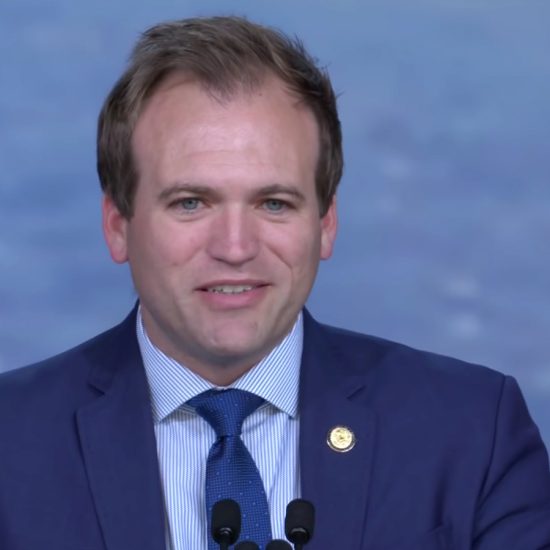

Evangelical Christians from various countries wave American flags in Jerusalem in 2015. Israeli regulators on Sunday, June 28, 2020, announced they ordered a U.S.-based evangelical broadcaster taken off the air, saying the channel hid its missionary agenda when it applied for a license. The controversy over GOD TV’s “Shelanu” station has put Israel and its evangelical Christian supporters in an awkward position. Evangelicals, particularly in the United States, are among the strongest supporters of Israel, which Israel has long welcomed. But most Jews view any effort to convert them as deeply offensive. (AP Photo/Sebastian Scheiner, File)
JERUSALEM (AP) — Israeli regulators on Sunday announced they ordered a U.S.-based evangelical broadcaster taken off the air, saying the channel hid its missionary agenda when it applied for a license.
In his decision, Asher Biton, the chairman of the Cable and Satellite Broadcasting Council, said he had informed “GOD TV” on Thursday that it had seven days to stop broadcasting.
“The channel appeals to Jews with Christian content,” he wrote. “Its original request,” he said, stated that it was a “station targeting the Christian population.”
The decision was first reported by the Haaretz daily.
The controversy over GOD TV’s “Shelanu” station has put Israel and its evangelical Christian supporters in an awkward position, exposing tensions the two sides have long papered over.
Evangelical Christians, particularly in the United States, are among the strongest supporters of Israel, viewing it as the fulfillment of biblical prophecy. Some see it as the harbinger of a second coming of Jesus Christ and the end of days.
Israel has long welcomed evangelicals’ political and financial support, especially as their influence over the White House has risen during the Trump administration, and it has largely shrugged off concerns about any hidden religious agenda.
But most Jews view any effort to convert them to Christianity as deeply offensive, a legacy of centuries of persecution and forced conversion at the hands of Christian rulers. In part because of those sensitivities, evangelical Christians, who generally believe salvation can only come through Jesus and preach the Gospel worldwide, rarely target Jews.
In a statement, Shelanu said it was stunned by what it called Biton’s “unprofessional decision.”
It said its existing license “stated unequivocally” that it would broadcast its content in Hebrew to the Israeli public. Most Christians in the Holy Land speak Arabic. “Therefore it is not at all clear what was wrong beyond political considerations,” it said.
Ron Cantor, Shelanu’s Israeli spokesman, said the station would reapply for a license. He said the station’s management hopes the council will approve the request “and thus avoids a severe diplomatic incident with hundreds of millions of pro-Israel evangelical Christians worldwide.”
When GOD TV reached its seven-year contract with Israel’s main cable provider earlier this year, it presented itself as producing content for Christians.
But in a video message that was later taken down, GOD TV CEO Ward Simpson suggested its real aim was to convince Jews to accept Jesus as their messiah.
“God has supernaturally opened the door for us to take the Gospel of Jesus into the homes and lives and hearts of his Jewish people,” Simpson said in the video.
In a subsequent video, Simpson apologized for any offensive remarks and said GOD TV would comply with all regulations.
Freedom of religion is enshrined in Israeli law, and proselytizing is allowed as long as missionary activities are not directed at minors and do not involve economic coercion.
GOD TV was founded in the U.K. in 1995 and eventually grew into a 24-hour network with offices in several countries. Its international broadcasting licenses are held by a Florida-based non-profit. It claims to reach 300 million households worldwide.






